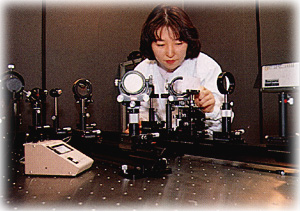Faculty of Science
Consisting of the Department of Mathematical and Physical Sciences and
the Department of Chemical and Biological Sciences, the Faculty of Science was
established in 1992 to supervise education and research in the basic sciences of
mathematics, physics, chemistry and biology.
In the early days of Japan Women's University, education and research
in the fields of basic science were traditionally supervised by the Department
of Natural Sciences, which was part of the Faculties of Home Economics and
Education. In 1944 the Department of Sciences for Home Economics was established
under the Faculty of Home Economics to supervise education and research in the
basic natural sciences. In 1948 the new department was split into the Department
of Sciences for Home Economics: Section I, for mathematics, physics, and
chemistry, and the Department of Sciences for Home Economics: Section II, for
biology and agricultural science. During this period, the University graduated
more than 50 Doctors of Science, producing a group of women scientists who were
active in many scientific fields in Japan.
 Drawing upon this tradition in response to the demands of a new age, the Faculty
of Science was established as an independent faculty in 1992 with a mandate to
supervise education and research in the basic sciences. Among the women's
colleges in Japan, two state-run universities are the only others to offer an
independent faculty for the natural sciences. At Japan Women's University, the
idea of a faculty for the basic natural sciences has been around since the
University's establishment in 1901. In this sense, the concept for the Faculty
of Science is rooted in tradition while simultaneously being ahead of its time.
Drawing upon this tradition in response to the demands of a new age, the Faculty
of Science was established as an independent faculty in 1992 with a mandate to
supervise education and research in the basic sciences. Among the women's
colleges in Japan, two state-run universities are the only others to offer an
independent faculty for the natural sciences. At Japan Women's University, the
idea of a faculty for the basic natural sciences has been around since the
University's establishment in 1901. In this sense, the concept for the Faculty
of Science is rooted in tradition while simultaneously being ahead of its time.
Two departments comprise the Faculty of Science. The Department of
Mathematical and Physical Sciences is responsible for overseeing education and
research in these two traditionally close fields. The Department of Chemical and
Biological Sciences, meanwhile, supervises integrated education and re-search in
the fields of chemistry and biology, which represent the material and life
sciences in the broadest sense.
Both Departments, which integrate a number of fields while retaining a
solid foundation in the unique academic structures of each, offer a wide range
of academic disciplines playing a critical role in today's society. They include
mathematical science, information science, computer science, molecular biology,
and environmental science. Development of these new fields will require
researchers who not only have a basic mastery of the fields of mathematics,
physics, chemistry, and biology but also have the flexibility and enthusiasm to
apply this knowledge In an integrated manner. The nurturing of female scientists
to become future leaders in their fields is the central purpose of this Faculty.
Both Departments strive to educate female scientists capable of playing an
active role in the advanced information and technology society of the future and
to engage in independent research based on close cooperation.
